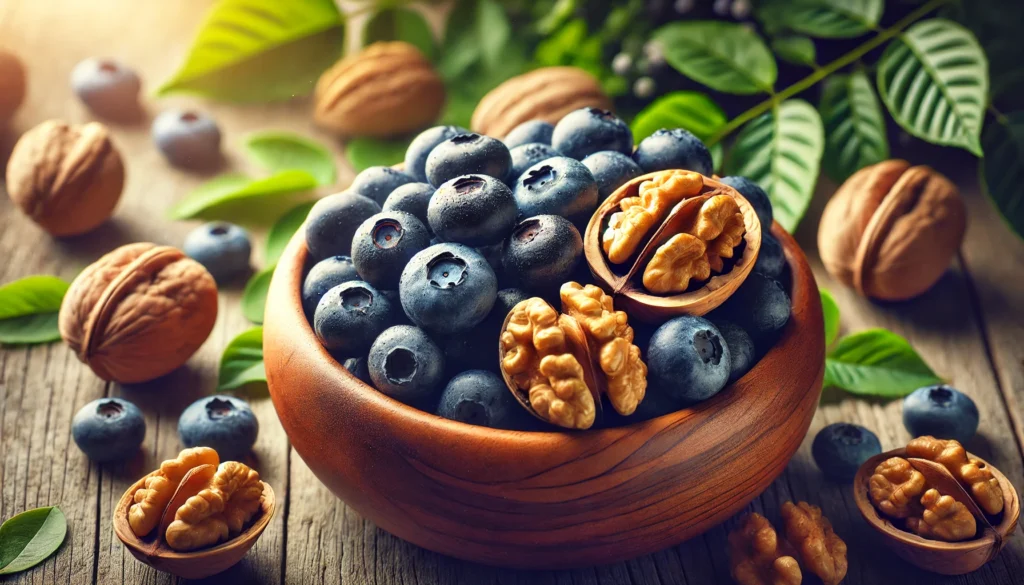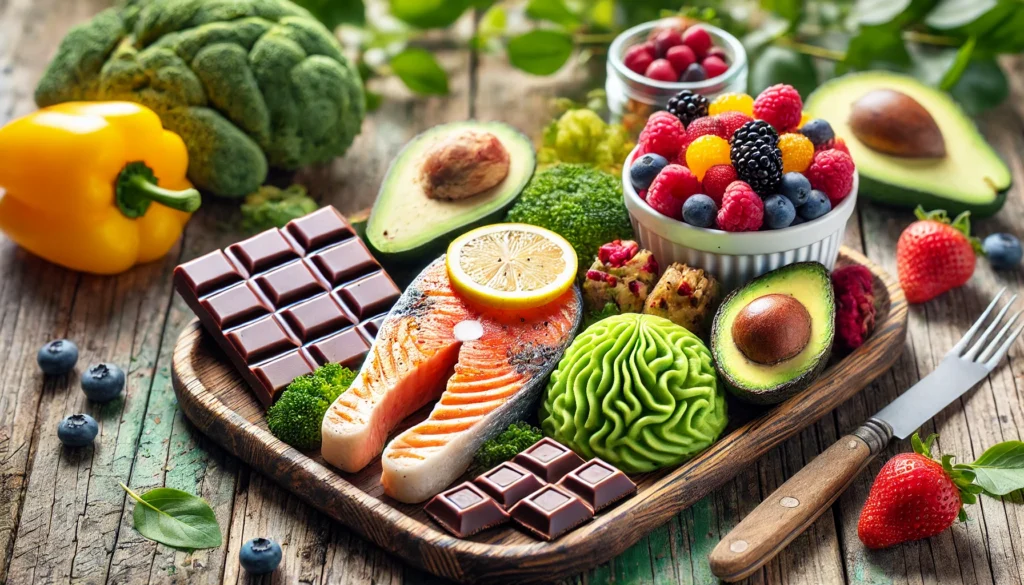Introduction: The Connection Between Diet and Cognitive Performance
In today’s fast-paced academic environment, students, professionals, and lifelong learners are constantly seeking ways to enhance their cognitive abilities. Whether preparing for an important exam, tackling a research project, or simply striving for optimal mental clarity, nutrition plays a crucial role in brain function. The foods we consume have a direct impact on focus, memory, and overall cognitive performance.
Understanding the significance of brain-boosting foods is essential for anyone looking to maximize their intellectual capabilities. Studies have shown that specific nutrients can enhance neurotransmitter activity, reduce oxidative stress, and support long-term brain health. By incorporating the best food for studying into your diet, you can improve concentration, enhance memory retention, and sustain mental energy throughout the day.
This article delves into the science behind brain food for exams, exploring the most effective nutrients and foods that help you focus while studying. We will also provide practical dietary recommendations and meal-planning strategies to optimize cognitive performance. By the end of this discussion, you will have a clear understanding of how to fuel your brain for peak productivity.
You may also like: Best Brain Foods for Focus, Memory, and Longevity: What Science Says
The Role of Nutrition in Cognitive Function
Nutrition is one of the most overlooked factors in academic and professional performance. The brain, like any other organ, requires specific nutrients to function at its best. Essential fatty acids, antioxidants, vitamins, and minerals all contribute to cognitive enhancement by supporting neuronal function, reducing inflammation, and improving blood flow to the brain.
One of the primary ways that food influences brain function is through neurotransmitter production. Neurotransmitters, such as dopamine, serotonin, and acetylcholine, regulate mood, memory, and concentration. Foods rich in amino acids, such as lean proteins and nuts, provide the building blocks necessary for neurotransmitter synthesis.
Additionally, antioxidants play a vital role in protecting brain cells from oxidative damage. Berries, leafy greens, and dark chocolate contain high levels of antioxidants, which help neutralize free radicals and reduce the risk of neurodegenerative diseases. Omega-3 fatty acids, found in fatty fish and flaxseeds, are essential for maintaining the integrity of neuronal membranes and improving synaptic plasticity.
The importance of hydration should also not be overlooked. Dehydration can lead to brain fog, decreased concentration, and impaired memory. Drinking adequate water throughout the day ensures that oxygen and nutrients are efficiently delivered to brain cells.
By understanding the intricate relationship between nutrition and cognitive performance, individuals can make informed dietary choices that support mental agility and long-term brain health.

Best Brain Food Before an Exam: Nutrients That Enhance Memory and Focus
Before an important exam, it is crucial to consume foods that enhance memory, focus, and mental stamina. The following nutrients have been scientifically proven to support cognitive function and should be incorporated into pre-exam meals:
Omega-3 Fatty Acids
Omega-3 fatty acids, particularly EPA and DHA, are essential for brain health. These fatty acids enhance neuronal communication, reduce inflammation, and support memory retention. Fatty fish such as salmon, mackerel, and sardines are excellent sources of omega-3s. For those following a plant-based diet, chia seeds, flaxseeds, and walnuts provide alternative sources of these essential fats.
Antioxidants
Antioxidants combat oxidative stress, which can negatively impact memory and cognitive function. Blueberries, strawberries, and raspberries are rich in flavonoids that enhance neural signaling and improve memory recall. Dark chocolate, which contains flavonoids and caffeine, can also boost alertness and concentration.
B Vitamins
B vitamins, particularly B6, B12, and folic acid, play a key role in neurotransmitter synthesis and energy metabolism. Deficiencies in these vitamins can lead to cognitive decline and mental fatigue. Foods such as eggs, lean meats, leafy greens, and legumes provide an excellent source of B vitamins.
Protein
Protein-rich foods help sustain energy levels and support neurotransmitter production. Lean meats, eggs, Greek yogurt, and nuts are excellent sources of high-quality protein. Consuming a protein-rich meal before an exam can enhance mental endurance and reduce fatigue.
Complex Carbohydrates
Complex carbohydrates provide a steady release of glucose, the brain’s primary energy source. Unlike simple sugars, which cause energy crashes, complex carbohydrates offer sustained cognitive function. Whole grains, quinoa, oats, and sweet potatoes are ideal sources of complex carbohydrates for long-lasting brain power.
Good Study Food: What to Eat While Studying
Maintaining focus and productivity during long study sessions requires a well-balanced diet that supports mental endurance. The following foods help sustain concentration and cognitive efficiency:
Nuts and Seeds
Almonds, walnuts, and pumpkin seeds are packed with healthy fats, protein, and micronutrients that support brain function. These foods are also rich in magnesium, which helps reduce stress and improve cognitive performance.
Avocados
Avocados contain healthy monounsaturated fats that enhance blood flow to the brain. They also provide vitamin K and folate, which protect against cognitive decline.
Leafy Greens
Spinach, kale, and Swiss chard are high in antioxidants, vitamins, and minerals that promote neural health. These vegetables help reduce inflammation and support overall brain function.
Green Tea
Green tea contains L-theanine, an amino acid that promotes relaxation without causing drowsiness. Combined with caffeine, green tea enhances focus, alertness, and mental clarity.
Yogurt and Fermented Foods
Probiotic-rich foods, such as yogurt, kimchi, and kefir, support gut health, which is directly linked to brain function. A healthy gut microbiome reduces inflammation and improves neurotransmitter activity.

Foods That Help You Focus While Studying: Meal Planning for Cognitive Enhancement
To optimize cognitive function, it is essential to plan balanced meals that include brain-boosting nutrients. Here is an example of a daily meal plan designed to enhance focus and memory:
Breakfast: Scrambled eggs with spinach and whole-grain toast, accompanied by a smoothie with blueberries, flaxseeds, and Greek yogurt.
Mid-Morning Snack: A handful of almonds and a cup of green tea.
Lunch: Grilled salmon with quinoa and roasted Brussels sprouts.
Afternoon Snack: Dark chocolate with walnuts and a banana.
Dinner: Chicken stir-fry with brown rice and steamed broccoli.
Frequently Asked Questions (FAQ) on Brain Food for Studying
1. How does diet influence memory retention and learning ability?
The foods we consume play a crucial role in memory retention and learning efficiency. Nutrient-dense foods provide the brain with essential vitamins, minerals, and antioxidants that support neural function and cognitive processing. Omega-3 fatty acids, for instance, enhance synaptic plasticity, making it easier for neurons to communicate and retain information. Consuming the best food for studying can help reduce cognitive fatigue and improve recall speed, which is particularly beneficial when preparing for exams. Including brain food for exams in daily meals ensures long-term cognitive benefits, leading to sustained academic and professional performance.
2. What is the best brain food before an exam for optimal focus and concentration?
Before an exam, it is essential to consume a combination of protein, healthy fats, and complex carbohydrates to provide sustained energy and cognitive sharpness. Eggs, which are rich in choline, support neurotransmitter function, improving focus and memory. A meal including salmon, avocado, and whole grains is considered the best brain food before an exam due to its balance of essential nutrients. Dark chocolate, containing flavonoids and caffeine, can also enhance alertness and mental clarity. Choosing the right study food can mean the difference between feeling sluggish and being mentally sharp during a test.
3. Are there specific foods that help you focus while studying for long hours?
Yes, several foods are particularly effective at sustaining focus and mental energy during extended study sessions. Nuts such as almonds and walnuts provide healthy fats and vitamin E, which protect brain cells from oxidative stress. Green tea, with its combination of caffeine and L-theanine, enhances alertness while promoting relaxation, preventing study-related stress. Leafy greens like spinach and kale contain folate and antioxidants that reduce cognitive decline and improve concentration. Including good study food in your daily diet ensures steady glucose levels, reducing brain fog and fatigue. Consistently incorporating these foods into your routine can improve information retention and comprehension.
4. Can a poor diet negatively affect cognitive function and study performance?
Absolutely. A diet high in processed foods, sugar, and unhealthy fats can impair cognitive function and hinder learning ability. High sugar consumption can lead to blood sugar fluctuations, resulting in brain fog, sluggishness, and difficulty concentrating. Deficiencies in essential nutrients such as B vitamins and omega-3 fatty acids are linked to memory decline and increased mental fatigue. Without proper study food, students may experience decreased motivation, slower problem-solving abilities, and difficulty retaining information. Maintaining a well-balanced diet with nutrient-rich foods is key to supporting sustained mental performance.
5. What are some quick and easy brain food snacks for studying?
For students who need quick but effective brain food for test preparation, there are several convenient options. A handful of mixed nuts provides healthy fats and proteins that keep energy levels stable. Greek yogurt with honey and blueberries offers probiotics for gut-brain health while supplying antioxidants for cognitive function. Dark chocolate with almonds delivers a boost in concentration without the sugar crash associated with conventional sweets. Hummus with whole-grain crackers is another great study food, offering complex carbohydrates and protein for sustained focus. These simple yet powerful snacks ensure that studying remains productive without compromising health.
6. How does hydration impact cognitive function while studying?
Staying hydrated is just as important as consuming the best food for studying when aiming for peak cognitive performance. Dehydration leads to reduced blood flow to the brain, causing fatigue, headaches, and a decline in focus. Even mild dehydration can impair short-term memory and make it harder to concentrate during prolonged study sessions. Drinking water regularly and incorporating hydrating foods such as cucumbers, oranges, and watermelon can help maintain mental clarity. Pairing hydration with brain food for exams ensures optimal study performance and prevents cognitive burnout.
7. What are some dietary habits that improve long-term brain health for students?
Students should focus on maintaining a diet that consistently includes foods rich in brain-supporting nutrients. Consuming fatty fish twice a week ensures an adequate intake of omega-3s, which are essential for brain development and function. A Mediterranean-style diet, rich in whole grains, lean proteins, and vegetables, has been linked to improved cognitive longevity and memory retention. Reducing processed foods and artificial sweeteners minimizes inflammation, which can negatively impact learning ability. Incorporating brain food for test preparation regularly—not just before exams—helps build a foundation for lifelong cognitive health. A diet emphasizing variety and balance ensures that the brain receives a full spectrum of essential nutrients.
8. Can caffeine improve study performance, and what are the best sources?
Caffeine can be beneficial in moderation, as it enhances alertness and reaction time. However, consuming excessive amounts may lead to jitteriness and energy crashes, which negatively impact study sessions. Green tea is a preferred alternative to coffee because it provides caffeine along with L-theanine, promoting calm focus without overstimulation. Dark chocolate is another great source, offering a mild caffeine boost while delivering antioxidants that support cognitive function. For students seeking sustained energy, pairing caffeine with protein-rich study food helps maintain stable blood sugar levels. Choosing natural sources of caffeine over sugary energy drinks prevents sudden energy crashes that hinder concentration.
9. Are there specific foods that reduce stress and anxiety during intense study periods?
Yes, certain foods contain nutrients that naturally lower stress levels and support emotional resilience during high-pressure study periods. Magnesium-rich foods like pumpkin seeds and spinach help relax muscles and regulate stress hormones. Bananas contain vitamin B6, which aids in serotonin production, promoting a positive mood and reducing anxiety. Oatmeal is an excellent brain food for exams, as its complex carbohydrates stabilize blood sugar levels and provide a calming effect. Herbal teas such as chamomile and valerian root promote relaxation, making them good choices alongside other good study food. A well-balanced diet not only enhances memory but also supports emotional well-being during demanding academic periods.
10. What is the ideal meal plan for a study-intensive day?
An ideal meal plan for maximizing study efficiency includes balanced meals rich in brain-enhancing nutrients. Breakfast should include protein and complex carbohydrates, such as scrambled eggs with whole-grain toast and a smoothie with berries and flaxseeds. A mid-morning snack of nuts and green tea provides sustained energy without a crash. Lunch could feature grilled salmon with quinoa and roasted vegetables, ensuring omega-3s and fiber for cognitive support. In the afternoon, dark chocolate with almonds serves as a light yet effective brain food for test preparation. A dinner consisting of lean chicken stir-fry with brown rice and steamed broccoli provides essential amino acids and micronutrients for brain health. A diet planned around nutrient-dense study food enhances mental performance and ensures steady energy levels throughout the day.

Conclusion: Elevating Cognitive Performance Through Diet
The connection between nutrition and cognitive function is undeniable. By incorporating brain food for exams into your diet, you can enhance memory, sustain concentration, and improve overall mental performance. A diet rich in omega-3 fatty acids, antioxidants, B vitamins, and protein ensures that your brain receives the necessary nutrients for optimal function.
Making informed dietary choices is one of the most effective ways to support long-term cognitive health. Whether preparing for an important test or simply striving to stay sharp, consuming foods that help you focus while studying can make a significant difference.
By prioritizing brain-boosting nutrition, you can unlock your full intellectual potential and achieve academic success with confidence.
brain-boosting nutrition, cognitive enhancement diet, foods for mental clarity, study diet tips, brain health supplements, healthy eating for students, smart food choices, focus-enhancing meals, nutrient-rich brain food, concentration-boosting snacks, memory improvement diet, exam preparation nutrition, best foods for alertness, natural brain enhancers, hydration for cognitive function, superfoods for studying, diet and academic performance, stress-reducing foods, productivity-boosting meals, optimal brain fuel
Further Reading:
Best Foods for A Healthy Brain and Improved Memory
Foods linked to better brainpower
12 foods to boost brain function
Disclaimer
The information contained in this article is provided for general informational purposes only and is not intended to serve as medical, legal, or professional advice. While Health11News strives to present accurate, up-to-date, and reliable content, no warranty or guarantee, expressed or implied, is made regarding the completeness, accuracy, or adequacy of the information provided. Readers are strongly advised to seek the guidance of a qualified healthcare provider or other relevant professionals before acting on any information contained in this article. Health11News, its authors, editors, and contributors expressly disclaim any liability for any damages, losses, or consequences arising directly or indirectly from the use, interpretation, or reliance on any information presented herein. The views and opinions expressed in this article are those of the author(s) and do not necessarily reflect the official policies or positions of Health11News.


